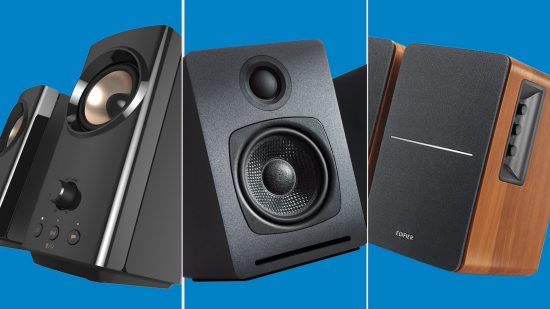Are you looking to find the best computer speakers for your PC? Well, you’re at the right place. Our list of the best speakers has something for everyone, whether you’re on a tight budget, need big bass above all else, or you’re after a compact but great-sounding set of speakers. We’ve got budget options under $70 all the way up to premium $300+ options, with plenty in between. And guess what? We’ve tested and reviewed every single speaker set we recommend below. You can read all about our testing methodology below and on our How we test page. Meanwhile, for more on how to choose the best speaker for your needs, head to the how to chose your computer speakers section at the bottom of this page.
Why you can trust us ✔ Custom PC has over 20 years of experience testing hardware. We share honest, expert advice to help you buy the best. Find out how we test.
The best computer speakers in 2024:
- Edifier R1280DB – the best computer speakers
- Creative T20 – the best budget computer speakers
- Audioengine A1 – the best small computer speakers
- Klipsch R-41PM – the best big bass 2.0 computer speakers
- Creative T60 – the best budget USB computer speakers
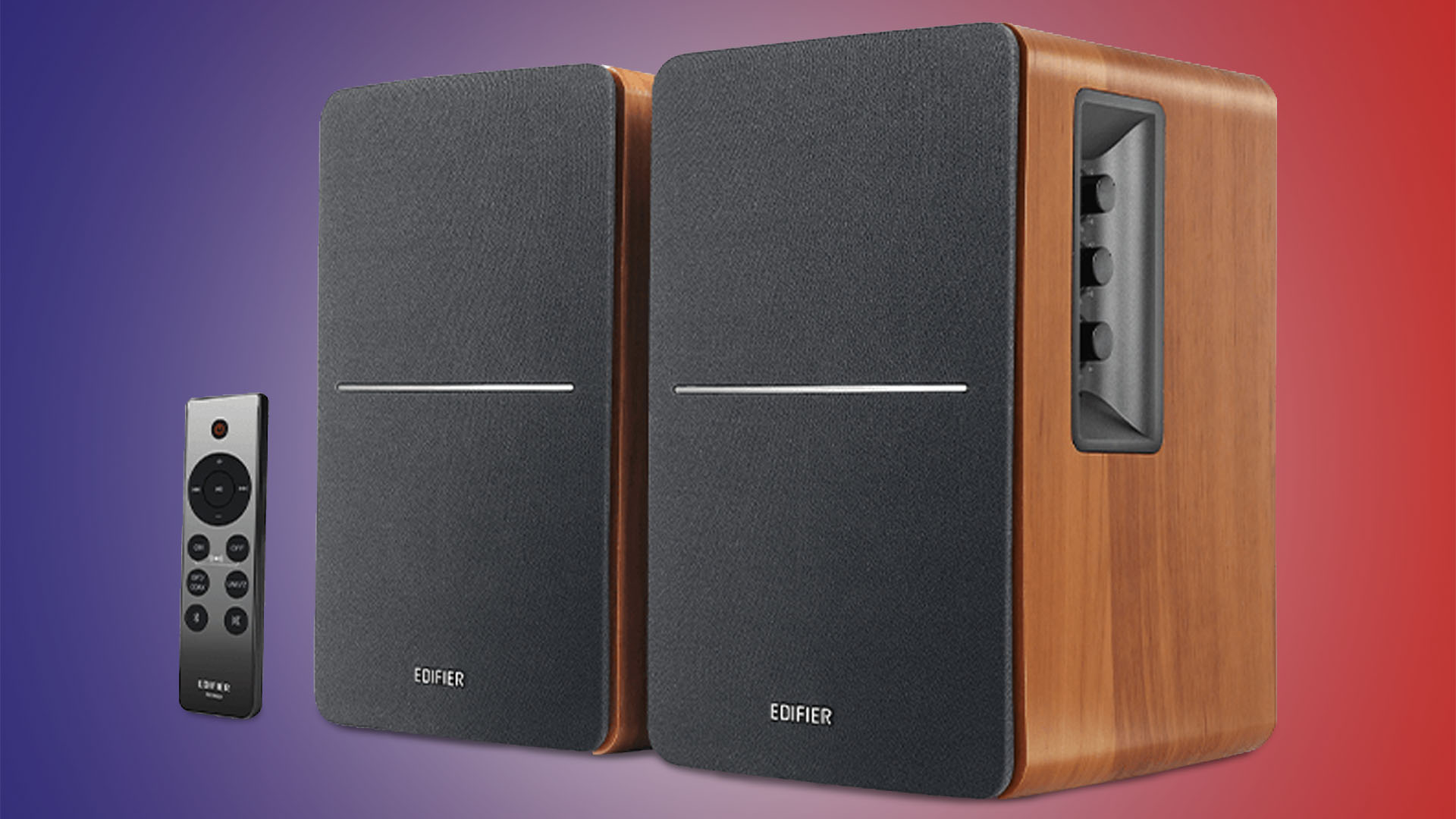
1. Edifier R1280DB
The best computer speakers are the Edifier R1280DB.
Edifier R1280DB specs:
| Dimensions (mm) | 146 × 196 × 234mm (W x D x H) |
| Audio config | 1 x 100mm woofer and 1 x 25mm tweeter per speaker with rear bass port |
| Nominal power output | 42W (2x21W) |
| Frequency range | 55Hz – 20,000kHz |
| Connections | 3.5mm stereo input, digital optical input, USB audio input, Bluetooth 5 |
| Extras | Remote control, volume, source, and power buttons on right speaker |
Pros
- Smart design
- Packed with features
- Great value
- Smooth, full sound
Cons
- Quite large units
- Lacks a little top-end detail
The Edifier R1280DB (and their Bluetooth-less cousins the R1280T) are fantastic low-end to mid-range PC speakers. For just $130 you get large, powerful speakers that sound and look great (wood, white, and black colors available), and they include loads of features too. They include several analog and digital inputs, along with Bluetooth, though they do lack a USB input. Spending more certainly gets you more high-frequency detail but these are still great for most uses, so long as you’re happy with how large they are. Read our full Edifier R1280DB review.
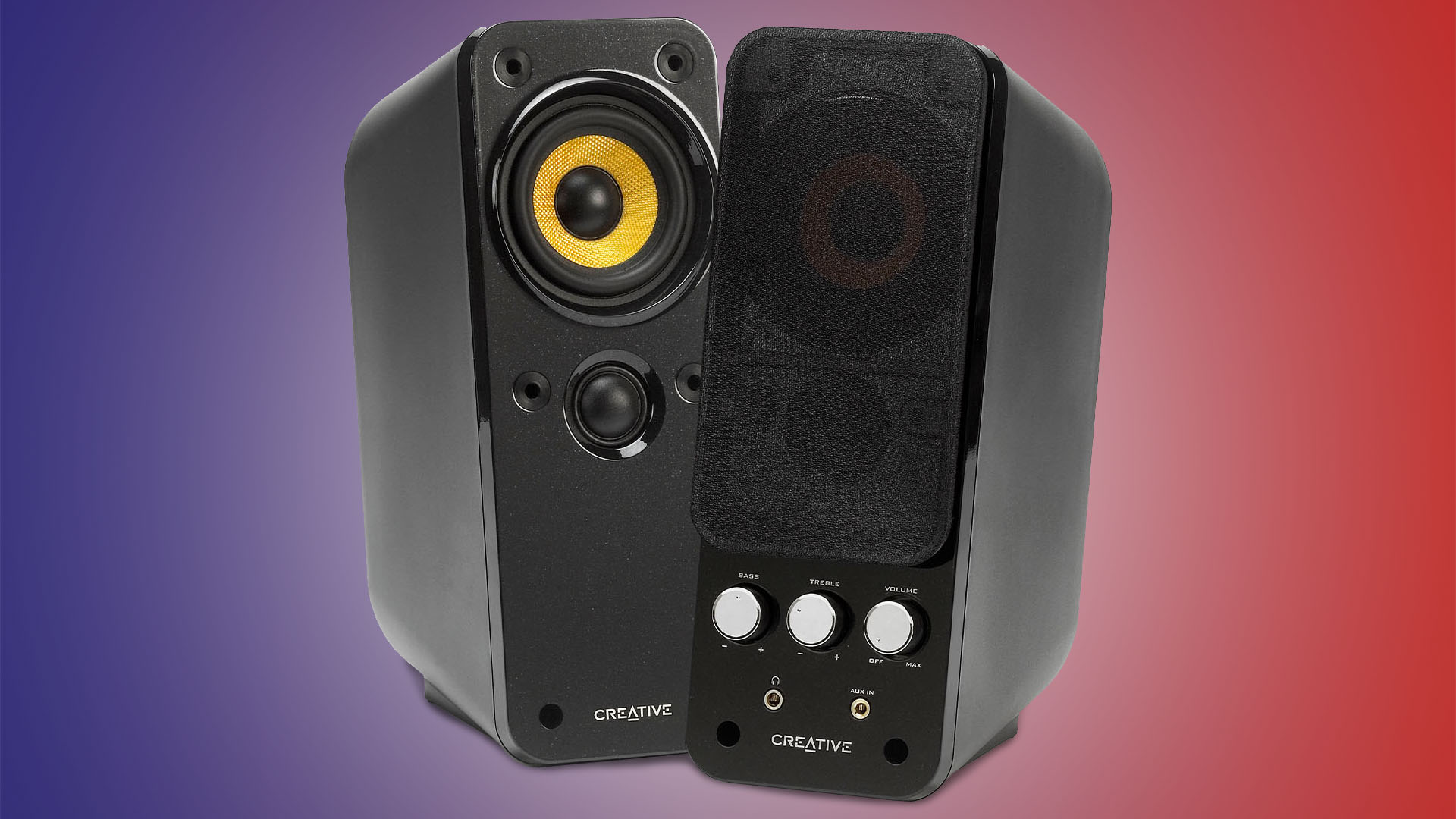
2. Creative Gigaworks T20 Series II
The best budget computer speakers are the Creative T20.
Creative Gigaworks T20 Series II specs:
| Dimensions (mm) | 88 x 143 x 230 (W x D x H) |
| Audio config | 1 x 75mm woofer and 1 x 20mm tweeter per speaker with bottom bass port |
| Nominal power output | 20W |
| Frequency range | 55Hz – 22,000kHz |
| Connections | 3.5mm stereo input, optical digital input, subwoofer output, Bluetooth 4 |
| Extras | Remote control, volume, source, and power buttons on right speaker, converts to mono mode, can add battery pack |
Pros
- Clean, simple design
- Great overall sound for the price
- Lots of mid-range warmth
Cons
- Basic feature set – no Bluetooth
- Lacks big sub bass
- Top-end detail reflects $70 price
- Rear-firing bass ports limits placement
Having been around for over a decade, the Creative T20 isn’t packed with modern features, but if you just want a simple analog set of speakers that will provide great sound for a modest price, they’re still hard to beat. They’re not exactly small but they’re also nowhere near the size of the Edifier or Klipsch speakers and their twin driver per speaker configuration ensures good sonic detail and power. You get a convenient headphone socket on the front of the right speaker and useful bass/treble dials to fine-tune the sound. Read our full Creative T20 review for more information.
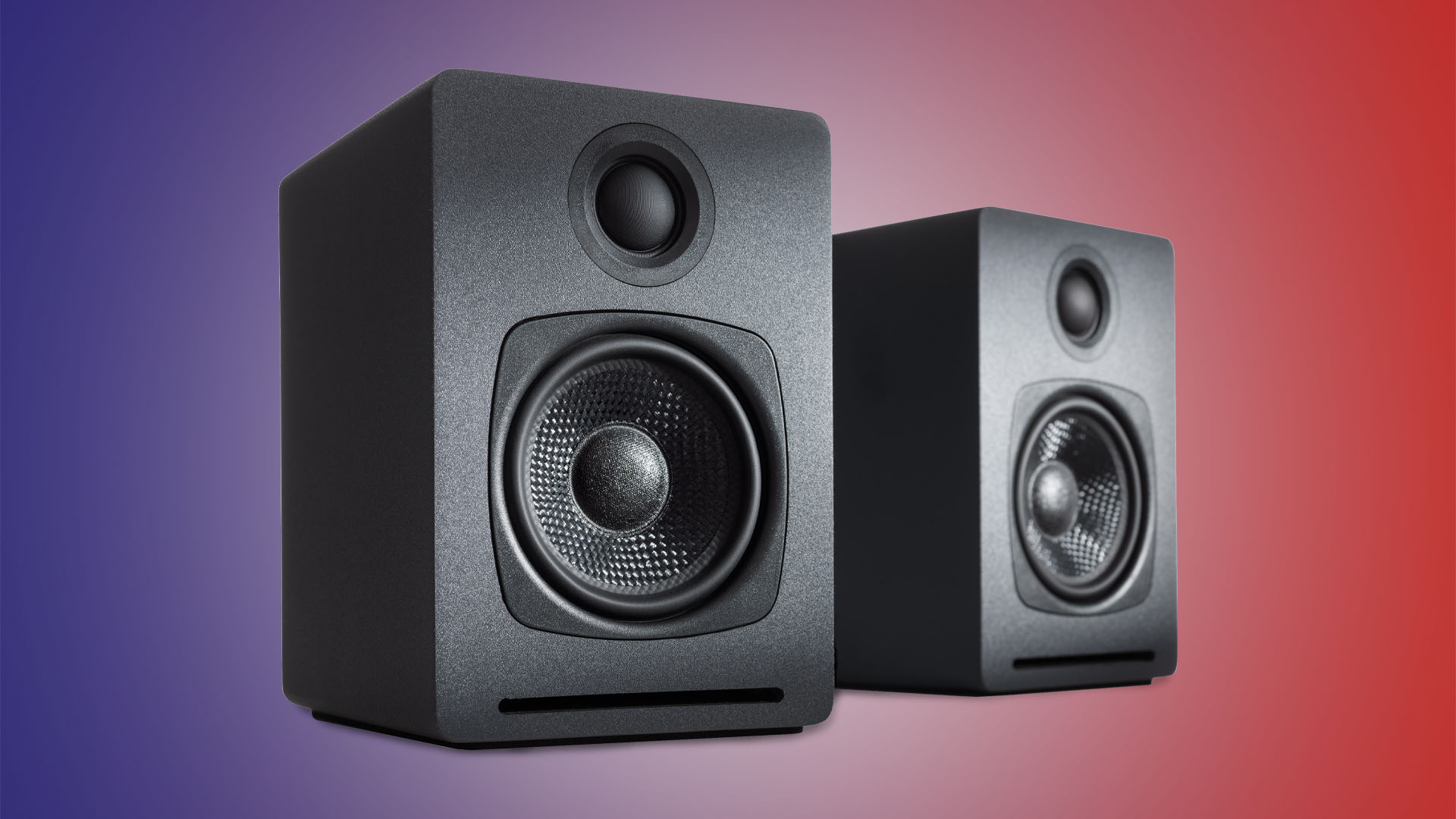
3. Audioengine A1
The best small computer speakers are the Audioengine A1.
Audioengine A1 specs:
| Dimensions (mm) | 102 x 133 x 152 (W x D x H) |
| Audio config | 1 x 70mm woofer and 1 x 19mm tweeter per speaker with front bass port |
| Nominal power output | 60W |
| Frequency range | 65Hz – 22,000kHz |
| Connections | 3.5mm stereo input, Bluetooth 5, phone output for subwoofer |
| Extras | Volume knob on right speaker |
Pros
- Great styling
- Really compact design
- Excellent audio clarity
- Decent value
Cons
- Inconvenient rear volume control
- Lacking in bass
- Short, so they need stands
- No USB or digital input
If you’re after a premium but petite set of speakers, the Audioengine A1 are the ones to go for. They’re just six inches tall and have front-firing bass ports so you can really tuck them into a corner without ruining their sound. They also look and feel premium (more so in the flesh than in photos) and deliver punchy, crystal-clear sound. Inevitably their size means they do lack bass but there’s an output for connecting a subwoofer. They’re not cheap but they deliver the sound and build you’d hope for their price, even if they lack any digital connections. For more information, check out our full Audioengine A1 review.
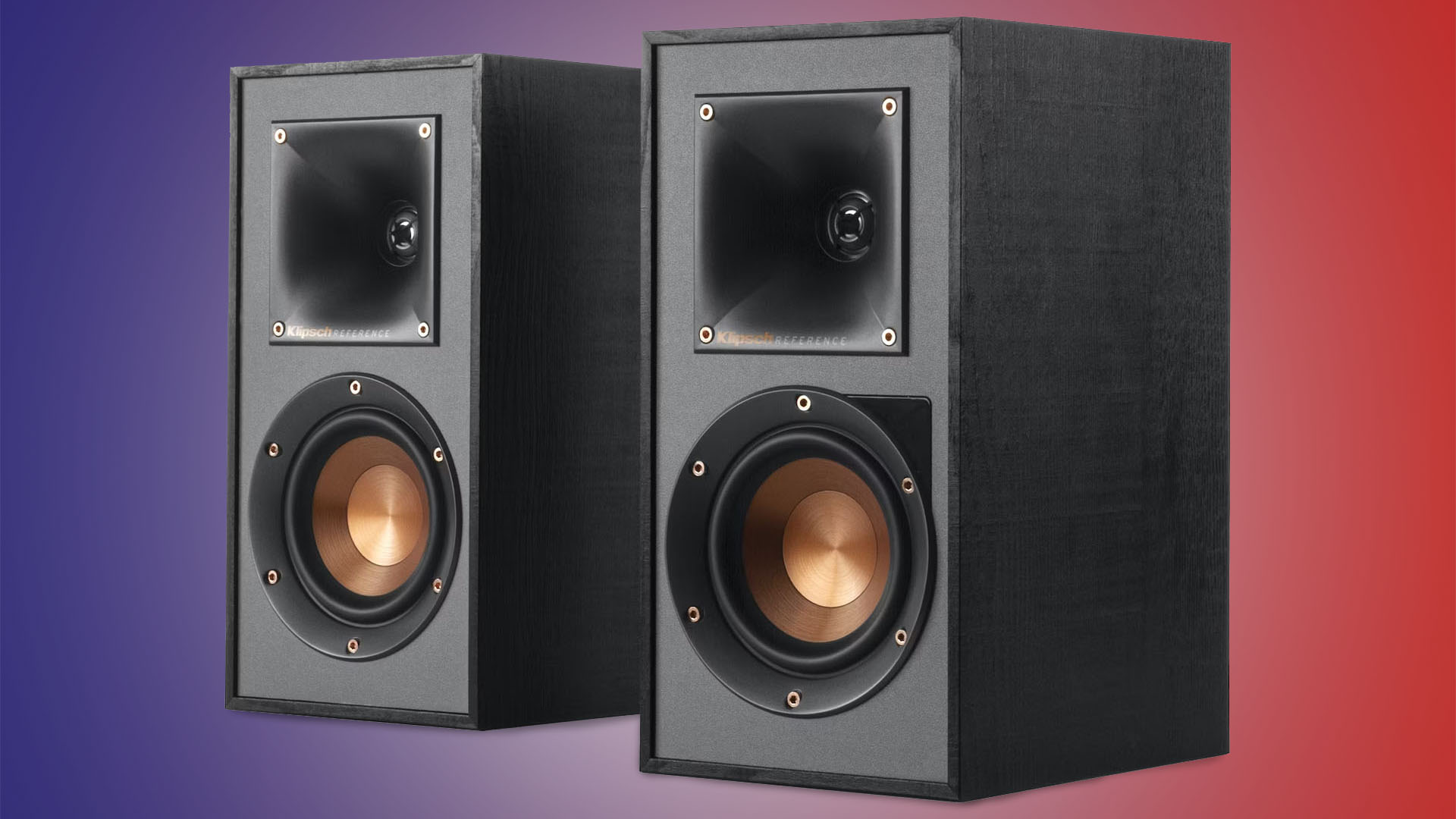
4. Klipsch R-41PM
The best big bass 2.0 computer speakers are the Klipsch R-41PM.
Klipsch R-41PM specs:
| Dimensions (mm) | 146 x 216 x 287 (W x D x H) |
| Audio config | 1 x 100mm woofer and 1 x 25mm tweeter per speaker with rear bass port |
| Nominal power output | 70W |
| Frequency range | 76Hz – 21,000kHz |
| Connections | Phono stereo input, 3.5mm stereo input, digital optical input, USB audio input, Bluetooth with aptX, RCA subwoofer output |
| Extras | Remote control, USB audio playback |
Pros
- Very powerful sound
- Masses of sonic detail
- Loads of bass
- Lots of features
Cons
- No front-mounted controls
- Rear bass port limits positioning
- Slightly boring design
- Bass a bit strong and non-adjustable
Pushing the limits of what counts as a computer/desktop speaker, these Klipsch R-41PM are very large – nearly 12-inches tall – but they deliver all the power, bass response, and top-end detail you’d hope for from such large and pricey speakers. What’s more, they include Bluetooth and USB audio input and have a convenient remote control. Their design is a bit boxy and bulky, and some may find their bass presence a touch strong, but outside of dedicated Hi-Fi speakers or high-end powered monitors, you’ll not find a better-sounding computer speaker. For more detail, check out our full Klipsch R-41PM review.
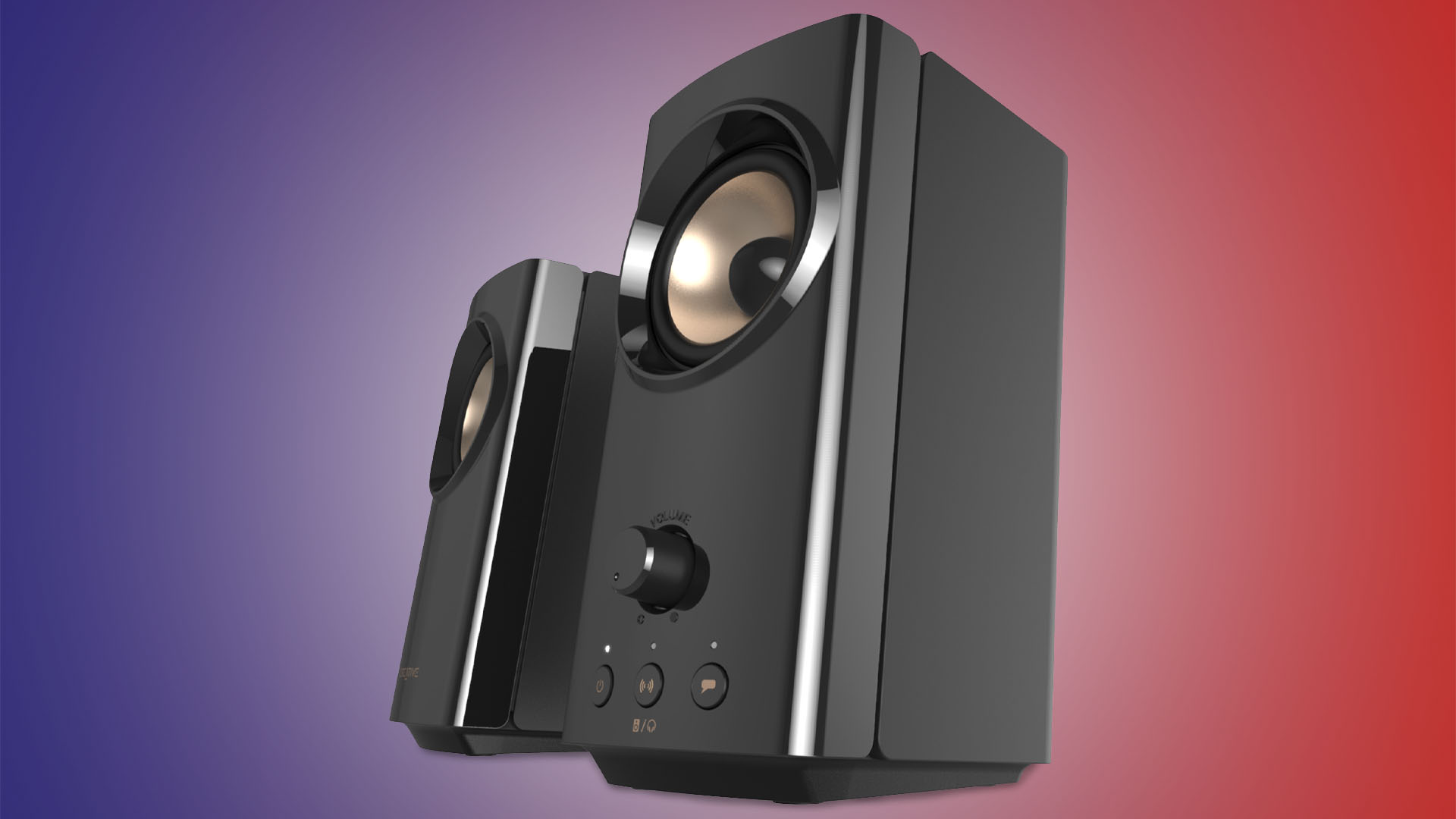
5. Creative T60
The best budget USB computer speakers are the Creative T60.
Creative T60 specs:
| Weight | 722g (right speaker), 632g (left speaker) |
| Dimensions (mm) | 105 x 104 x 128 (W x D x H) per speaker |
| Drivers | 1 x 2.75″ driver per speaker |
| Connections | Bluetooth, 3.5mm aux, USB |
| Frequency range | 98Hz-20kHz |
| Extras | USB and 3.5mm auxiliary cables; RGB lighting |
Pros
- Useful USB and Bluetooth connections
- Convenient controls and headset passthrough
- Plenty of volume with a warm sound
- Good value
Cons
- Lacks high-end detail
- Lacks sub-bass
- Audio compromised for convenience
If your computer doesn’t have a quality audio output that can work with the likes of the Creative T20 or a built-in Bluetooth adapter, speakers with a USB input are the way to go. The Creative T60 match the T20 for price but are better looking, smaller, and include Bluetooth and USB. They also have a convenient headset passthrough that will take your headset microphone output and run it through the speaker’s USB cable to your computer. The big compromise is reduced sound quality compared to the T20, with less bass and detail, but they still sound decent. Find out more in our full Creative T60 review.
Best computer speakers FAQ
How to choose your computer speakers
The right computer speaker for you will depend on your needs. Are you looking for great overall sound quality for listening to a wide variety of music or is thumping bass your biggest priority? Meanwhile, does your desk have plenty of space for speakers, or is a compact speaker a must? Then of course there’s budget to consider.
In general, if you’re after speakers that will suit a wide variety of music – from light acoustic and vocal tracks, to complex orchestral work, heavy metal, hip-hop, and EDM – then large, high-quality 2.0 speakers are the way to go – that’s those without a separate subwoofer.
Such speakers will also work great for gaming and movies, but cheaper, smaller units lack much sub-bass (the booming bass frequencies generally associated with separate subwoofers), which can leave explosions and other such noises sounding a little weak. Several such speaker sets can also have a subwoofer added to boost bass, so it’s not always a one or other situation.
If your primary concern is ensuring you do get a big bass hit, even if you’re on a budget and it compromises overall audio quality, a 2.1 speaker system is the way to go – that’s those that include a subwoofer and two (generally much smaller than 2.0 systems) desk speakers. However, while top-quality 2.1 speaker systems can easily rival 2.0 systems, generally for the same cost you’re comprising the rest of the speaker’s sound in favor of getting more bass by opting for a 2.1 system.
When it comes to desk size, 2.1 systems can be a great choice as they typically have smaller desk speakers than 2.0 systems and the subwoofer can be hidden under your desk. Meanwhile, if you have plenty of desk space, adding as large a speaker as you can fit will generally result in better sound, though always keep in mind these are supposed to primarily be computer speakers that you listen to from three feet away so there’s only so much volume you need most of the time.
Whether you opt for small or large, 2.0 or 2.1 speakers, one thing that can benefit any computer speaker is to mount the main speakers (i.e. not the subwoofer) on speaker stands. These not only put the speakers more in line with your ears, improving immersion, but they reduce sound reflection off your desk. This reflection can cause interference that messes with sound quality – it’s particularly something to look out for with smaller speakers as they sit so low to the desk.
How we test the best computer speakers
At Custom PC, we want you to be confident that our reviews are trustworthy, reliable, and repeatable so that you can easily compare products and find the best speakers for your needs.
We test computer speakers in a variety of ways. Firstly, once setup, we assess the default sound quality using a range of music, movie, and gaming scenarios. We’re looking for speakers that can deliver high-end detail, mid-range warmth, and low-end rumble so that ideally they suit a wide variety of listening purposes.
For games and movies, we particularly look out for thumping bass impact and high-frequency clarity that help ensure you can hear movie dialogue or crucial in-game sound cues clearly while also enjoying the power of louder sound effects such as explosions. Meanwhile, for most genres, more mid-range is desirable to provide a warm, comforting sound that’s easy to listen to for extended periods.
After testing default sounds, we also test any extra sound adjustment, such as digital surround sound or adjusting bass/treble dials. Some speakers can be transformed by just a small simple tweak while others simply can’t be saved, no matter how much you mess around with them.
We also look at the design of each speaker, checking for premium build materials – such as using dense MDF cabinet construction rather than plastic – and nice finishes. The quality of all dials and other controls is also crucial to both the pleasure of using a product as well as its likely longevity.
Also potentially crucial are any extra features. The most basic computer speakers simply have an analog input but more expensive units include Bluetooth for easily connecting your phone, laptop, or tablet while others have a USB audio input, which can save you having to use a separate sound card with your computer. Others might include a remote control for quick and easy volume and input control. Depending on your needs these extras could be crucial or pointless.
If you’ve finally found your special speakers, why not check out our best gaming headset, best gaming keyboard, and best CPU for gaming guides to complete your setup.
